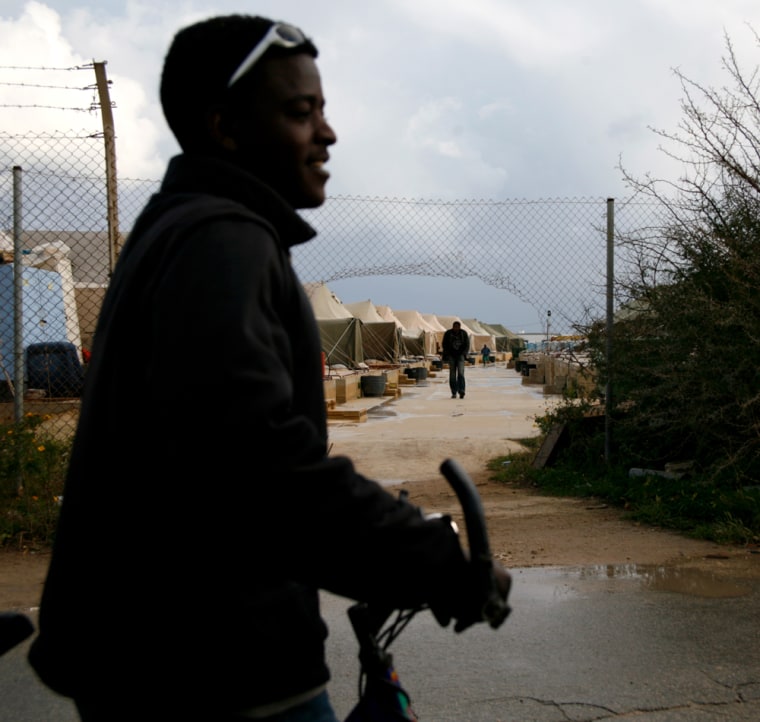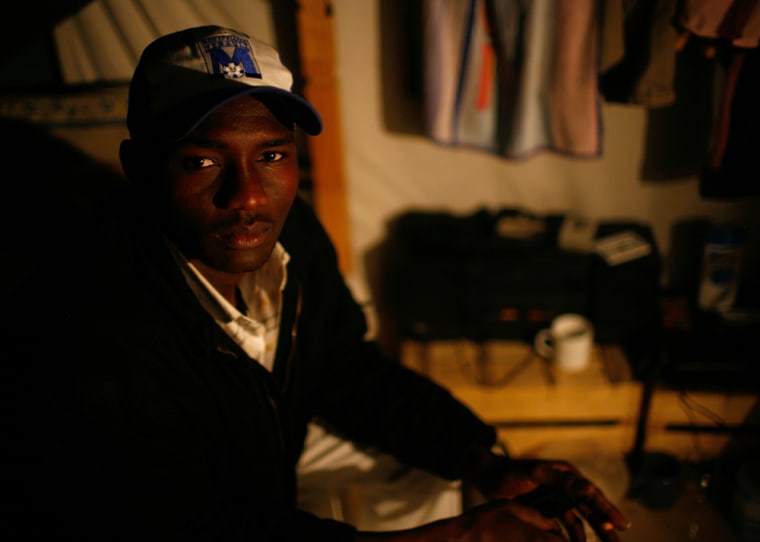In a cruel twist, every flight that takes off to the European mainland from Malta’s main airport can be seen from inside the Hal Far Open Center, a nearby tent city housing up to 600 men, women and children.
Built at the beginning of 2006 to accommodate the rising number of "boat people" from Africa, it is the end of the road for many asylum seekers and migrants who traversed the Sahara desert to reach Libya, and then crossed the Mediterranean Sea with hopes of landing in Italy or Spain.
"Nobody wants to come to this place,” said Ahmed Waddai, a Chadian sporting a baseball cap and thick scar across his left cheek.
“We were in the sea and (Malta’s coast guard) came and collected us; we wanted to go to Italy,” he said, as he ate dinner in a tent that serves as a restaurant.
After spending months locked in closed detention centers on the tiny island, some people are granted asylum or humanitarian protection. But, no matter their status, most of the 1,000 to 2,000 people that arrive each year cannot find enough work to rent an apartment.
The people who live in the tent city are free to come and go, and have guests, although the Maltese government discourages visits by foreign journalists.
The fenced-in facility includes rows of huge khaki-colored military tents, blue portable toilet and shower units, a Muslim prayer tent, and rows of metal lockers for residents’ valuables.
Inside the dining tent, men watched news of Sudan’s Darfur region on an Arabic television station as a storm shook the canvas walls and dogs howled outside.
During a recent visit, Ahmed welcomed reporters with a warm smile, and offered to share his fried liver, tomatoes, onions and fava beans.
The 24-year-old had been living in the camp for several months and was trying to learn English with the help of a Libyan asylum seeker.
Inside Ahmed's tent
In Ahmed’s tent, bunk beds lined the sides with blankets hung around some of them. In his section of the tent, two Sudanese men, Mubarak Ahmed and Mahjoub Hussein, warmed their feet over a hot plate.

Their small partitioned-off area featured few amenities. The floor was covered in rain water, and a light bulb glared, hanging from a top bunk by a cord. Along the side of the tent was a small stereo with a CD player, and a clothes iron sat atop piled-up belongings on an extra bunk.
With no washing machine at the camp, the men said they washed their clothes by hand and then ironed them. Hot water in the portable showers also ran out quickly. So, on cold evenings water was heated in kettles on hotplates, poured into buckets, and carried across the field to the shower units.
Ahmed and his companions had spent the day unsuccessfully looking for work.
“I search for work every day,” said Mahjoub, describing his daily routine of waking at 4:30 a.m. to catch a bus to another town where construction foremen choose day laborers.
"It's no better than Chad but we cannot do anything. We can't go forward and we can't go back. We can do nothing,” Ahmed said, sucking a cigarette down to its filter.
Family dreams of leaving
In one of the family tents, a young Ethiopian couple, Alem and Tsega Welgis, offered tea to visiting reporters.
A couple dozen coffee cups and tea glasses were precariously stacked on a narrow side table near a statue of Mary and a picture of Jesus. Above them, a plastic cross hung from a cord attached to the tent wall. Tsega shivered in the cold.
Whenever Alem found work, Tsega would cook meat, vegetables and Ethiopian injera bread.
“Ingredients are there, but without money, I cannot get them,” she said of the East African recipes she liked to cook. Outside of preparing food and cleaning, there was no difference between one day and another, she said.
“I want to move to anyplace,” her husband said.
